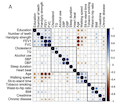Abstract
Background: While health-related quality of life (HRQoL) has clinical value, its determinants, particularly objective health-related measurements, have not been fully explored. This study seeks to identify the biological indicators that relate to HRQoL among a group of older Korean adults using a machine-learning approach.
Methods: We used physical and mental scores from the 36-item Short Form Health Survey (SF-36) to measure HRQoL among older Korean adults who participated in the Korean Longitudinal Study of Aging (KLoSA) biomarker pilot study (N = 385). The variables for the multivariate penalized regression analysis included demographic factors, medical measurements, physical performance, and health-related behaviors.
Results: The multivariate profiles identified several significant biomarkers that relate to quality of life. Among the 20 variables, handgrip strength was the most powerful indicator in both men and women for the SF-36 physical scores, followed by walking speed. Age and total sleep duration exclusively were significantly associated with the SF-36 physical scores only in women, whereas body mass index, blood pressure, and sit-to-stand times were unique elements in men.
Conclusions: The present study suggests significant physical indicators that explain quality of life in elderly populations, using a data-driven approach. Based on these findings, maintaining a good level of physical performance is considered a key element of successful aging.
